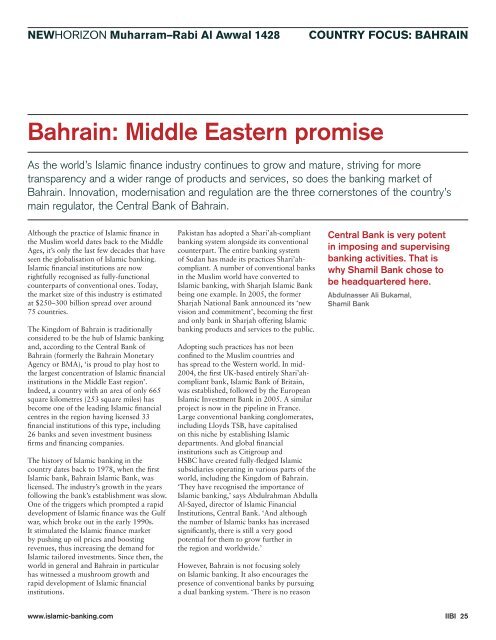issue no. 163 - january–march 2007 / muharram–rabi al awwal 1428
issue no. 163 - january–march 2007 / muharram–rabi al awwal 1428
issue no. 163 - january–march 2007 / muharram–rabi al awwal 1428
- No tags were found...
You also want an ePaper? Increase the reach of your titles
YUMPU automatically turns print PDFs into web optimized ePapers that Google loves.
NEWHORIZON Muharram–Rabi Al Aww<strong>al</strong> <strong>1428</strong><br />
COUNTRY FOCUS: BAHRAIN<br />
Bahrain: Middle Eastern promise<br />
As the world’s Islamic finance industry continues to grow and mature, striving for more<br />
transparency and a wider range of products and services, so does the banking market of<br />
Bahrain. In<strong>no</strong>vation, modernisation and regulation are the three cornerstones of the country’s<br />
main regulator, the Centr<strong>al</strong> Bank of Bahrain.<br />
Although the practice of Islamic finance in<br />
the Muslim world dates back to the Middle<br />
Ages, it’s only the last few decades that have<br />
seen the glob<strong>al</strong>isation of Islamic banking.<br />
Islamic financi<strong>al</strong> institutions are <strong>no</strong>w<br />
rightfully recognised as fully-function<strong>al</strong><br />
counterparts of convention<strong>al</strong> ones. Today,<br />
the market size of this industry is estimated<br />
at $250–300 billion spread over around<br />
75 countries.<br />
The Kingdom of Bahrain is tradition<strong>al</strong>ly<br />
considered to be the hub of Islamic banking<br />
and, according to the Centr<strong>al</strong> Bank of<br />
Bahrain (formerly the Bahrain Monetary<br />
Agency or BMA), ‘is proud to play host to<br />
the largest concentration of Islamic financi<strong>al</strong><br />
institutions in the Middle East region’.<br />
Indeed, a country with an area of only 665<br />
square kilometres (253 square miles) has<br />
become one of the leading Islamic financi<strong>al</strong><br />
centres in the region having licensed 33<br />
financi<strong>al</strong> institutions of this type, including<br />
26 banks and seven investment business<br />
firms and financing companies.<br />
The history of Islamic banking in the<br />
country dates back to 1978, when the first<br />
Islamic bank, Bahrain Islamic Bank, was<br />
licensed. The industry’s growth in the years<br />
following the bank’s establishment was slow.<br />
One of the triggers which prompted a rapid<br />
development of Islamic finance was the Gulf<br />
war, which broke out in the early 1990s.<br />
It stimulated the Islamic finance market<br />
by pushing up oil prices and boosting<br />
revenues, thus increasing the demand for<br />
Islamic tailored investments. Since then, the<br />
world in gener<strong>al</strong> and Bahrain in particular<br />
has witnessed a mushroom growth and<br />
rapid development of Islamic financi<strong>al</strong><br />
institutions.<br />
Pakistan has adopted a Shari’ah-compliant<br />
banking system <strong>al</strong>ongside its convention<strong>al</strong><br />
counterpart. The entire banking system<br />
of Sudan has made its practices Shari’ahcompliant.<br />
A number of convention<strong>al</strong> banks<br />
in the Muslim world have converted to<br />
Islamic banking, with Sharjah Islamic Bank<br />
being one example. In 2005, the former<br />
Sharjah Nation<strong>al</strong> Bank an<strong>no</strong>unced its ‘new<br />
vision and commitment’, becoming the first<br />
and only bank in Sharjah offering Islamic<br />
banking products and services to the public.<br />
Adopting such practices has <strong>no</strong>t been<br />
confined to the Muslim countries and<br />
has spread to the Western world. In mid-<br />
2004, the first UK-based entirely Shari’ahcompliant<br />
bank, Islamic Bank of Britain,<br />
was established, followed by the European<br />
Islamic Investment Bank in 2005. A similar<br />
project is <strong>no</strong>w in the pipeline in France.<br />
Large convention<strong>al</strong> banking conglomerates,<br />
including Lloyds TSB, have capit<strong>al</strong>ised<br />
on this niche by establishing Islamic<br />
departments. And glob<strong>al</strong> financi<strong>al</strong><br />
institutions such as Citigroup and<br />
HSBC have created fully-fledged Islamic<br />
subsidiaries operating in various parts of the<br />
world, including the Kingdom of Bahrain.<br />
‘They have recognised the importance of<br />
Islamic banking,’ says Abdulrahman Abdulla<br />
Al-Sayed, director of Islamic Financi<strong>al</strong><br />
Institutions, Centr<strong>al</strong> Bank. ‘And <strong>al</strong>though<br />
the number of Islamic banks has increased<br />
significantly, there is still a very good<br />
potenti<strong>al</strong> for them to grow further in<br />
the region and worldwide.’<br />
However, Bahrain is <strong>no</strong>t focusing solely<br />
on Islamic banking. It <strong>al</strong>so encourages the<br />
presence of convention<strong>al</strong> banks by pursuing<br />
a du<strong>al</strong> banking system. ‘There is <strong>no</strong> reason<br />
Centr<strong>al</strong> Bank is very potent<br />
in imposing and supervising<br />
banking activities. That is<br />
why Shamil Bank chose to<br />
be headquartered here.<br />
Abdulnasser Ali Bukam<strong>al</strong>,<br />
Shamil Bank<br />
www.islamic-banking.com IIBI 25
















